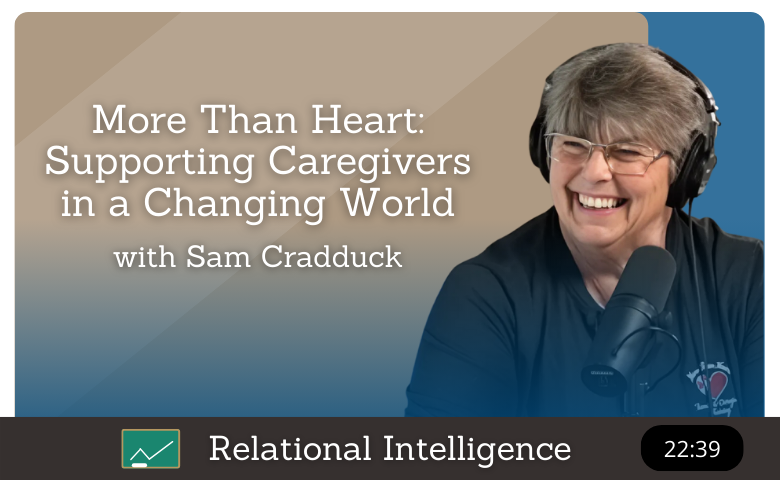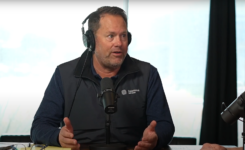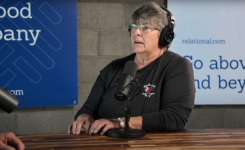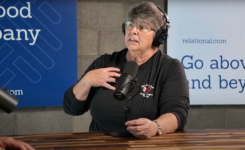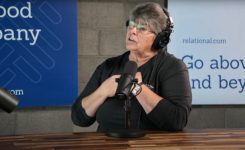Sam Cradduck:
By degree, I’m a gerontologist, but at heart, I’m a caregiver. I’ve provided care for family members, worked professionally in caregiving, and now I teach other caregivers and families how to navigate the world they find themselves in.
Mike Rankin:
Yeah, and it’s not a world that many of us are trained for.
Sam Cradduck:
Oh no, we are very ill-equipped and ill-prepared. That’s why we call our training program More Than Heart, because as family members, you have the heart to jump in and do it, but you don’t necessarily have the skills or understanding of what’s happening. It takes more than heart to provide dignity, respect, and proper care.
We aim to bring understanding and skills because caregiving requires a specific skill set. More than that, it’s about seeing things from your loved one’s perspective—understanding what they’re going through so that you’re better equipped to provide the right care at the right level.
Mike Rankin:
That’s such an important perspective. Speaking for my generation—people in their mid-50s—we’re watching our parents turn 70, 80, and, God willing, even older. And I think we often just look at things through our own lens.
Sam Cradduck:
Exactly. Instead of thinking, “I have to give up my retirement, my personal time, my vacations to care for my parents,” try to see it from their side. They’re aging, losing abilities, and grieving the life they thought they would have.
The problem is that most of us don’t see aging as something that limits us. We assume we’ll just keep getting older but stay the same. But that’s not the reality. It’s like the frog in boiling water—the change is gradual, but one day, you realize you’re facing limitations you never expected.
Mike Rankin:
Right. We don’t picture ourselves needing mobility aids or struggling with everyday tasks.
Sam Cradduck:
And neither did they! That’s the kicker. They wake up one day and think, “What happened? Why does it hurt when I stand up? Why do I have trouble controlling my bladder?”
When you put yourself in their shoes and think, “This is going to be tough when it happens to me,” then you can start approaching your loved ones with empathy. You can acknowledge their struggle and say, “Mom, I know this is hard, but we’re going to get through it together.”
That approach gives them the dignity and respect they deserve.
Mike Rankin:
I imagine that mindset shift is also a relief for caregivers. It’s not about taking control; it’s about walking alongside them.
Sam Cradduck:
Exactly! And that’s one of the biggest mistakes caregivers make—we want to step in and fix everything. But aging isn’t something you can fix. You can’t rescue them from getting older.
The key is not to take away their independence prematurely.
Mike Rankin:
That’s a great point. Can you give an example of where people tend to take control too soon?
Sam Cradduck:
A big one is food choices. Say Mom has been drinking coffee every morning for 65 years, but now her doctor says she has high blood pressure. The kids rush in and take away her coffee cup, thinking they’re protecting her.
But life takes away enough. If someone wants to have pie for dinner, let them have pie for dinner! We think we can fix things by controlling their diet, but that’s not our role.
Instead of trying to govern our aging parents, we need to focus on supporting them. Otherwise, it creates resistance and tension in the relationship.
Mike Rankin:
That makes so much sense. And it’s not just the practical aspects—there are a lot of emotional layers to caregiving, especially within families.
Sam Cradduck:
Absolutely. Sibling dynamics are a big part of this. Often, one sibling steps up as the primary caregiver while the others step back. That creates frustration and resentment.
But here’s what I tell caregivers: You can’t change your siblings. You can only control your own actions. Love them in spite of their absence, and appreciate that you’re getting time with your parent that they won’t have.
Mike Rankin:
And sometimes those siblings later regret not being more involved.
Sam Cradduck:
Exactly. They may stay away, thinking they have more time, but when their parent passes, they’re left with regret.
Mike Rankin:
So, it comes down to giving grace—to our parents, our siblings, and ourselves.
Sam Cradduck:
Yes! The whole process of caregiving involves grief—anticipatory grief. We’re grieving the parent we once knew, and they’re grieving the life they thought they would have.
Grief looks different for everyone. Some people are warriors who jump into caregiving, while others can’t face it because it’s too overwhelming.
Mike Rankin:
That’s such an important reminder. And caregiving isn’t just emotional—it’s also a financial and logistical challenge.
Sam Cradduck:
Exactly. Many people struggle to balance caregiving with their job. And employers need to recognize that their workforce is dealing with this.
We’ve seen great progress in employer support for mental health, but caregiving is another area where support is crucial.
Mike Rankin:
What are some ways employers can better support caregivers?
Sam Cradduck:
Flexibility is key. COVID showed us that alternative work arrangements can be just as productive. Employers should consider that caregivers are juggling immense responsibilities.
We’ve seen companies introduce daycare for children—why not senior daycare at workplaces? We have to think outside the box.
Mike Rankin:
That’s a fascinating idea. The financial burden of caregiving is huge, and not everyone can afford professional care.
Sam Cradduck:
Exactly. The cost of 24/7 home care is around $250,000 a year. Most families can’t afford that. We need creative solutions, and we need to empower family caregivers with resources.
Mike Rankin:
Speaking of resources, tell me about The Vault.
Sam Cradduck:
The Vault is a VIP section on my website, morethanheart.com. It has hundreds of short videos, full-length masterclasses, and a community forum where caregivers can connect, share experiences, and get support—because no one should go through this alone.
Mike Rankin:
That’s incredible. So, to recap:
- Give grace—to parents, siblings, and ourselves.
- Find community and support.
- Advocate for flexibility at work.
- Seek out resources like The Vault at morethanheart.com.
Sam, this has been such a powerful conversation. Thank you for sharing your wisdom!
Sam Cradduck:
Thank you, Mike. It’s been a pleasure.


